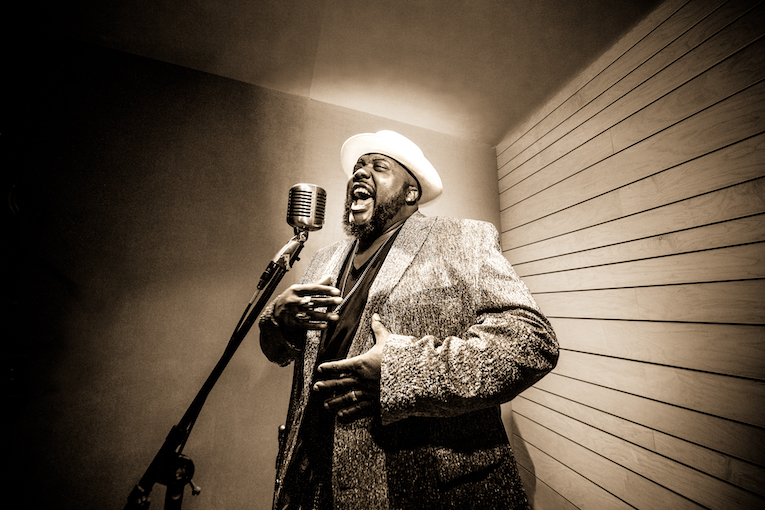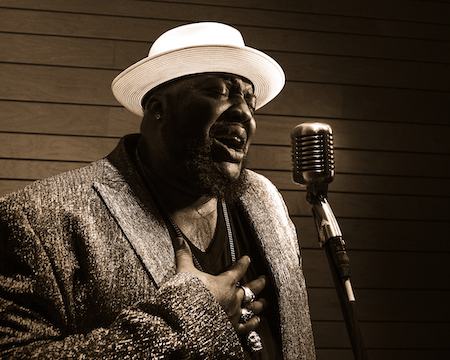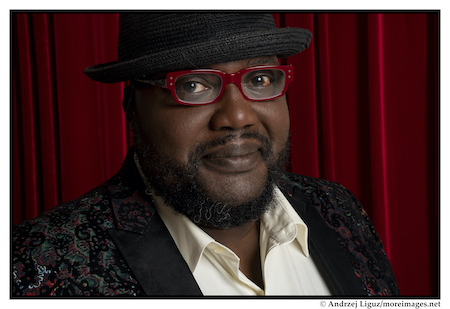
Photo: Sugaray Rayford by Allison Morgan
Interview: Sugaray Rayford Gets Deep
By Martine Ehrenclou
Grammy nominated Soul-blues powerhouse vocalist and songwriter Sugaray Rayford is a musical force. A dynamic singer and performer, Rayford’s last album, Somebody Save Me was nominated for a Grammy Award, produced by Eric Corne. He won Blues Music Awards for ‘B.B. King Entertainer of the Year’ and ‘Soul Blues Male Artist of the Year’ in 2020.
From Smith County, TX, Sugaray grew up singing in the church. After moving to San Diego, he eventually joined the acclaimed Mannish Boys, singing lead vocals on their album Double Dynamite that won ‘Best Traditional Blues Album’ in the 2013 Blues Music Awards.
Rayford’s latest album, In Too Deep, was released on March 4 via Forty Below Records, produced by Eric Corne. In Too Deep blends funky R&B grooves with retro-soul, led by Rayford’s raw power as a vocalist and entertainer. Several of the songs are intimate glimpses into Sugaray’s world, his hope for people to come together. Others focus on love. One reveals his struggle with insomnia from PTSD from serving as a Marine for ten years. In Too Deep is a mix of insight and party time fun.
Rayford has been nominated for 2022 Blues Awards for ‘B.B King Entertainer of the Year’, ‘Band of the Year’, and for ‘Instrumentalist-Vocals.”
Martine: Congratulations on your new Blues Music Award nominations. Very exciting.
Sugaray: It is very exciting. I’m really excited that the band got a nomination. I’ve been blessed to have quite a few through the years, between the Mannish Boys and myself. But I’ve only had two with the band. Now I have an all new band since the beginning of the pandemic. I was really happy to see them get nominated. That was really cool.
Martine: And congratulations on your new album In Too Deep. It is a great album. The songs are so good.
Sugaray: Thank you. Eric Corne is a hell of a song guru, and he’s really keen on me giving him ideas and thoughts, and him taking it and turning it into these beautiful songs. I’m a songwriter but some people are just really good wordsmiths. Every song is literally my story and he was able to flesh that out into words. I’ve always told him, “I don’t sing anything that isn’t true to me because it loses the vitality, the energy.”
Martine: Tell me about In Too Deep.
Sugaray: The songs were written in 2020 and our country was in turmoil. Whatever side of the fence you’re on, or if you’re straddling that fence, we’re all Americans, and we stumble. The pandemic put that under a microscope. Eric and I both wanted to craft songs that made people feel like dancing, that put a mirror up to your face with truth in the stories, the heartfelt-ness, and they made you think. There’s humor and double entendre. But some of them are really deep issues that I wanted to talk about. As I keep getting further along in the game as an artist, I get more and more comfortable with talking about certain things.
I love the way Eric camouflaged them (the lyrics) in such lush musical arrangements. You listen to “Miss Information,” and you’re dancing. And then later at the end of the party that night, when everybody’s calmed down and you’ve had about three glasses of wine, you’re sitting there relaxing, and the song comes on again. Then you hear the words. It’s that old thing of putting sugar in the turpentine. (Laughter)
Martine: That’s a great expression. (Laughter)
Sugaray: There’s some really deep songs on there but I didn’t want to club people over the head. Because we have enough of that. And that’s why we were very comfortable with what song we started the album with, and then what song we ended the album with. I told Eric, “I want to lift people up. I want them to be happy.” All is not lost–that’s what I’m really trying to say. As bad as all this stuff is, we’re all one people. I know it sounds corny, but it is what it is.
Martine: You’re talking about your song “United We Stand”?
Sugaray: Yeah. “United We Stand” but even “Gonna Lift You Up.” With “United We Stand,” at the end of it, I’m like, ‘Come on, y’all, we’ll get through this together.’
Martine: They’re very uplifting songs. Bringing people together seems to be a theme that runs through several of your songs. Do you consider yourself a uniter?
Sugaray: I hope that I am. I’d much rather be a uniter than a divider. And don’t get me wrong, the dividers have their place. Because sometimes things do need to be torn apart because the status quo does not work. I’m not on some crusade. I care. African, white, Black, Asian, purple, orange, it don’t matter. If you’re a good person, you’re a good person. If you’re an asshole, you’re an asshole. Your color, for me, has nothing to do with it.
I’m just a country boy from East Texas, who grew up in a Black community, who wound up having the best luck. I’ve been able to travel the world and to let people know that we’re all each other’s neighbors, and look out for your brother. It’s my way of trying to spread love. I believe that. Like I said, some people think it sounds corny, but love really does conquer all. When I’m writing music, other than trying to get people to laugh and dance, when I get serious, that’s where it’s coming from.

Photo: Sugaray Rayford by Allison Morgan
Martine: You served as a Marine for ten years, and you wrote about your struggles with insomnia, related to PTSD in the opening track, “Invisible Soldier.” Can you tell me about that song?
Sugaray: That one was hard. That’s been decades and decades coming. Normally, the only person who ever knew anything about my PTSD, besides my brothers, was my wife. I’m way better than what I used to be. A lot of Marines, a lot of vets, Army vets, not that Air Force and Navy don’t, but definitely Marines and Army. There’s a lot of us that are just invisible soldiers.
I see guys homeless, and I see USMC tattooed on them, and I know they’re Marine vets. How do I put this? Our country has a very piss-poor record for mental health. I think we are probably the only fully developed country that does not really treat mental health. Now, you take that into a military account, that is a super hyper-focused lens and there’s probably three times what’s in the national average.
We have millions of invisible soldiers walking around every day. These are guys that would be great in construction or any type of job. And you’re talking about somebody being loyal, on time, motivated, and who knows how to get things done and wants to get things done.
During this last conflict, I felt bad. There were guys who were going into combat 5, 6, 7, 8 times. It used to be, you went into combat and then they rotated you out of a combat environment. And that was it. But a lot of these young guys, they now come home eight to 10 days, and then they’re rotating them back into a combat situation, because there’s not enough people volunteering for that.
Martine: So, you wanted to bring some of these issues to light. Was that part of the goal with the song or was it to share your personal experience?
Sugaray: It was part of the goal, and the other part was to finally, publicly exorcise my own demons. It’s one of those things that really festers in the darkness. I finally have gotten to the point and the age where I’m comfortable with who I am and what I’ve done. No one knew about me struggling with PTSD. No one knows that at night my brain gets going. I don’t go to sleep until six, seven o’clock in the morning. And I wake up at 10:30, 11:00. That’s a daily thing, but it’s getting better. But no one knows that, and it got so much better for me because of my wife. At first, I was afraid to tell her some of these things, because you don’t want people to look at you weird. You have to learn as you get older, they want to hear the romanticism that they saw on television. They don’t really want to know.
Martine: What do you do in the middle of the night when you’re up and you have this stuff going on?
Sugaray: Usually what I do is play video games, or recently, I downloaded the app ‘Calm.’
Martine: I use ‘Calm’ too.
Sugaray: It’s helped a lot. But the biggest thing for me has been my wife. I don’t know if she would want to tell you, but she could tell you about nights of me getting up at night and checking all the doors and windows. We had this beautiful little condo on the golf course and I’d be up walking the golf course perimeter. She pulled me out of that.
Martine: I have even more respect for you and what you’ve been through and for serving our country.
Sugaray: Well, we all do what we can. Most of them guys serve, not so much with officers maybe, but with enlisted guys, to escape a certain situation.

Photo: Sugaray Rayford by Andrzej Liquz
Martine: Tell me about how the songwriting process worked with Eric Corne.
Sugaray: This particular album, I actually got to do a bit more writing than I did on the first one. Because I was home, I did have a bit more input on the songs. And we (he and Eric) were talking every other day there for a while, refining the songs, what I wanted to say and how I wanted to say it. Again, he is a much better wordsmith than I, but I can be a very good storyteller. Eric is really good with being able to put into words that same feeling that I am eliciting from people live. He can do that. He will send me a melody with him on acoustic guitar. We’ll come up with a title, or sometimes the song comes up first. And then you take that into the studio with the guys, and they would really flex that out. And then later, Eric goes back, and he’ll bring in horns or backup singers. Then we’ll go back into his studio, and then I will lay down vocals.
Martine: You and Eric must have a great connection to be able to work together like that.
Sugaray: Well, I trust him. Especially this album. More so than any of the albums I’ve done, I am mentally naked on this album. I’m standing out there, I’m giving my unbridled truth and thoughts. I usually keep my thoughts to myself. And on stage, it’s about dancing and having fun.
Martine: Your singing is very soulful.
Sugaray: Lord, thank you.
Martine: You’re also a great entertainer. Is part of that because you love performing live?
Sugaray: Well, I love people. That’s my secret. I love people and I appreciate them. When I walk out on stage and I see people at a show, I know they probably drove an hour or so. And they spent another 45 minutes trying to park. So that was gas. They’re getting something to eat, something to drink. They’re paying to come in here. That’s money. And they deserve to have the best that I could give them because I appreciate that. And the biggest one is they spent their time. That is my motivating factor when I’m on stage.
I’m just doing my darndest to make sure that they have a good time. That’s why sometimes, in the middle of a show, I don’t care if I’m in a theater or a giant festival, I will stop the band and be like, “Nobody’s dancing.” I tell people, “This is not a concept. This is a party!” I truly mean that. You came here for 90 minutes to forget about what’s going on at home, to forget about the kids, forget about all that, and just have a good time. My job is to make sure you have a good time, and I take that very seriously.
For more information on Sugaray Rayford see his website here
Listen to “In Too Deep”

Sugaray joins Jimmie Vaughan, Duke Robillard, Monster Mike Welch and the Knickerbocker All Stars on “ Texas Rhody Blues.”